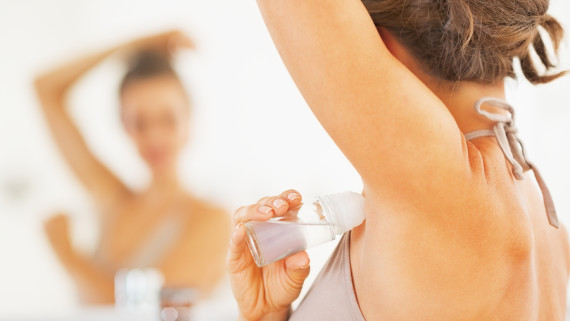Is your Deodorant Toxic?

It’s summer so we’re all a little bit hot, sweaty and maybe stinkier than usual. This is the time of year where many women start browsing the aisles for a stronger deodorant. Something that will keep us smelling as sweet as roses on a mid summer night. Antiperspirants work to block perspiration by blocking the pores that release sweat. Underarm sweat happens to be one of the primary routes of detoxification which means that when you use it your body will have a lot of difficulty detoxifying and you will be holding on to toxic chemicals that your body would normally try to expel. Unfortunately the stronger the deodorant, the more chemicals it contains which means the more damaging it is to our health. The problem is that we don’t tend to think of deodorant as something that can hurt your health and even increase the risk of breast cancer.
Aluminum is the active ingredient in most antiperspirants to help fight wetness and it can mimic estrogen and directly affect our bodies and damage DNA. Aluminum has been shown to be very concentrated in the same area of the breast where the highest proportion of cancers are diagnosed. Aluminum has also been linked to Alzheimer’s disease. This is a great article on some of the health effects of aluminum and Alzheimer’s and this one on breast cancer.
Most deodorants also contain parabens, fragrance, phthaltates, tricolsan, and butylated hydroxytoulene which have all been linked to health problems.
Phthalates are a man-made chemical that are typically used to make plastics flexible – but they are also used to prolong scents in many products including lotions, powders, nail polishes, hair sprays and shampoos. The Breast Cancer Fund states that phthalates have been found to be endocrine disruptors and have been linked to birth defects, fertility issues, asthma, obesity and even neurodevelopmental issues in newborns.
Perfumes give many products their intoxicating smell. But “parfums” and “fragrances” are typically nothing more than a mix of chemicals. The fragrance industry is allowed to regulate itself and has no outside agency to test for safety. Many times, labels reading “fragrance” actually contain phthalates, parabens and other chemicals. Even many products labeled “unscented” are filled with masking agents that block the smell of other fragrances. Only products labelled “fragrance-free” are truly free of fragrance and parfums. The Environmental Working Group has found fragrance mixes to be associated with dermatitis, respiratory distress, allergies and even possible effects on the reproductive system.
Here you can find common abbreviations for phthalates that you could find listed as an ingredient in your deodorant. Here are a few:
- DBP (di-n-butyl phthalate) and DEP (diethyl phthalate) are often found in personal care products, including nail polishes, deodorants, perfumes and cologne, aftershave lotions, shampoos, hair gels and hand lotions. (BzBP, see below, is also in some personal care products.)
- DEHP(di-(2-ethylhexyl) phthalate or Bis (2-ethylhexyl) phthalate) is used in PVC plastics, including some medical devices.
- BzBP(benzylbutyl phthalate) is used in some flooring, car products and personal care products.
- DMP (dimethyl phthalate) is used in insect repellent and some plastics (as well as rocket propellant).
Do natural deodorants really work?
Absolutely. Sweat isn’t really the cause of odor, it’s bacteria so the key is to find a great natural deodorant which can help fight bacteria – like tea tree oil or rosemary. Even coconut oil is fabulous. Sweating just activates bacteria so killing the bacteria will keep you from stinking. Most natural deodorants also contain some odor absorbing ingredients such as baking soda, clay or arrowroot.
I stopped using conventional deodorant a long time ago when I was finding that the ‘clinical protection’ wasn’t working well enough any more. I knew something was wrong so I switched and it took me a few months to find my very favorite brand. I will say it can take a few weeks and some trail and error for you to get used to it but it is worth it. Nobody wants to increase their risk of cancer if they can avoid it. Take a look at some of my very favorite natural products and my favorite deodorant on this list.
Or you can even try making your very own deodorant.










